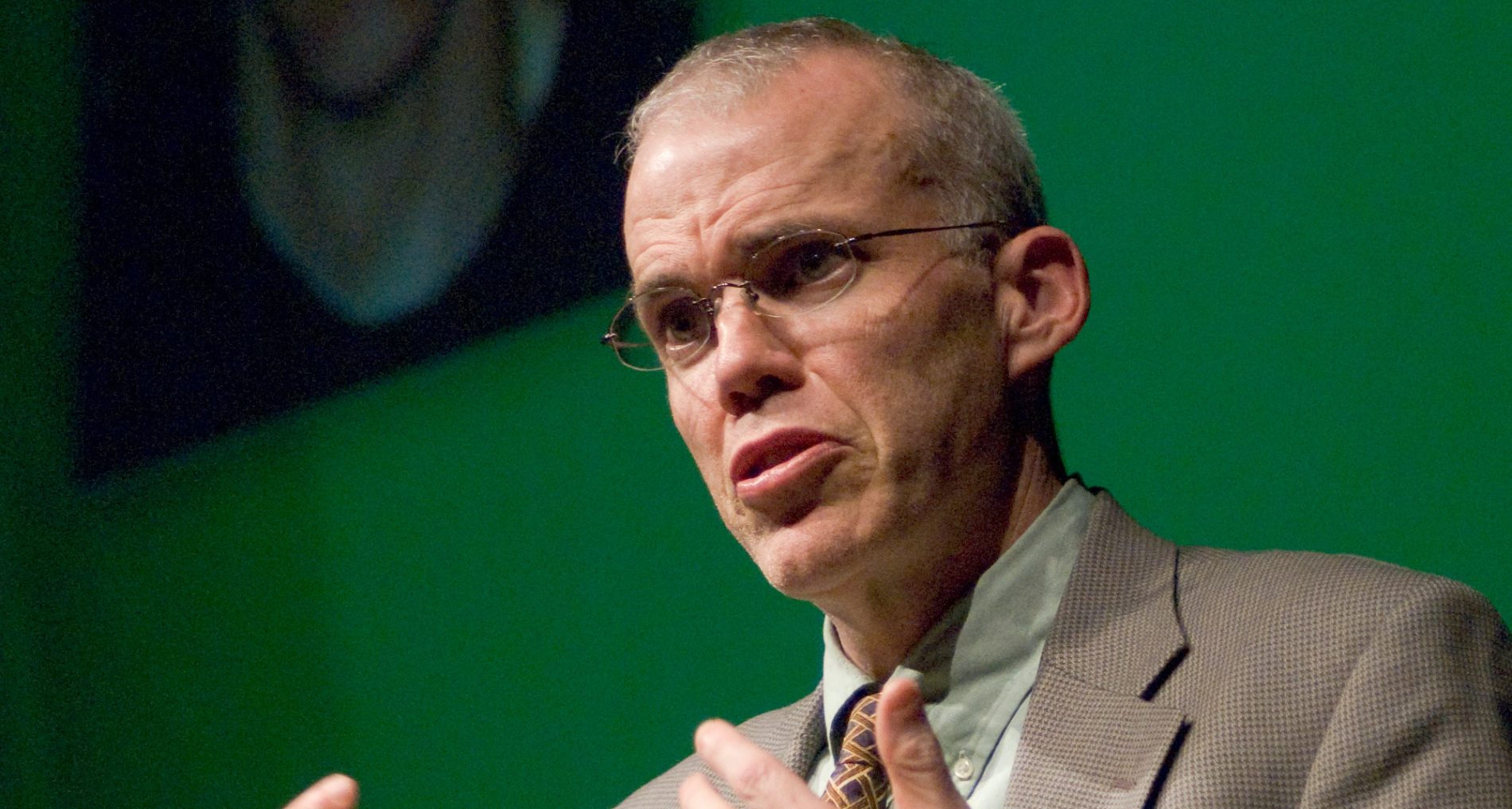
by DGR News Service | Jun 4, 2020 | ANALYSIS, Human Supremacy
Grassroots activist Suzanna Jones observes how even long-time environmentalists can become misled.
Faulty: Bill McKibben’s Crisis Logic
By Suzanna Jones
Vermont has a reputation for producing sturdy New England farm folk – hardscrabble people who lived full lives in challenging conditions. Our neighbors, Frank and Virginia, were prime examples. Living well into their eighties, they never owned a car or a phone, and never went on a vacation; they saved and reused everything, and grew their own food. Despite – or probably because of – the simplicity of their lives, they were happy.
Now there is a different kind of folk in the Green Mountain landscape. You’ll find them rushing to the airport in their hybrid car, smartphone glued to their hands, trying to catch a plane for their vacation abroad. Often well-meaning and ‘progressive’, they tend to look down on people like Frank and Virginia for not being ‘green’ enough. The reality, of course, is that these self-described environmentalists have a far greater impact on the Earth than those older Vermonters did.
Mainstream notions of monetary and career ‘success’ lead us to dismiss simpler ways of life. Unfortunately, this leaves us utterly wedded to the economic system that lies behind all our environmental problems, including climate change.
Crisis Logic
Bill McKibben‘s recent appearance in Hardwick to promote his new book, Falter, got me thinking about this. Back in 2008 McKibben correctly identified our growth-obsessed economy as the source of the ecological collapse we face today, explaining that when the economy grows larger than necessary to meet our basic needs, its social and environmental costs outweigh any benefits.
He pointed out that our consumerist way of life – in which we strive for more no matter how much we already have – is one of the ways corporations keep our bloated economy growing. The irony, he added, is that perennial accumulation does not even make us happy. But now, sadly, McKibben studiously avoids criticizing the very economy he once fingered as the source of our environmental crisis.
During his talk he referred to Exxon’s ‘big lie’: the company knew about climate change long ago but hid the truth. Ironically, McKibben’s presentation did something similar by hiding the fact that his only ‘solution’ to climate change – the rapid transition from fossil fuels to industrial renewables – actually causes astounding environmental damage.
Out of the Back Comes Modernity
Solar power, he said, is “just glass angled at the sun, and out the back comes ‘modernity’.” But solar is much more than just glass. One example? Like wind power, it requires the environmentally devastating – and fossil-fuel based – mining of rare earth metals. And that ‘modernity’ coming out the back? That is the lifestyle that is killing the planet.
McKibben extolled the virtues of Green Mountain Power’s industrial ‘renewable’ developments, failing to mention that GMP sells the Renewable Energy Credits (RECs) from those projects to out-of-state utilities, thereby subsidizing the production of dirty energy elsewhere. He also neglected to say that one of GMP’s parent companies is tar sands giant Enbridge, which owns a $1.5 billion stake in the Dakota Access Pipeline and is currently working to use Vermont as a corridor for future fracked-gas transport.
Therein Lies the Deception
McKibben once claimed that “every turn of the blade” of an industrial wind turbine “reduces fossil fuel consumption somewhere.” When the RECs are sold, however, this is simply untrue. And while the production and installation of every turbine has serious environmental costs, every reduction in consumption really does reduce fossil fuel use somewhere, while simultaneously reducing environmental impacts.
Renewables only make sense in tandem with drastic reductions in energy consumption, and are best implemented through small-scale, grid-free efforts. But what we have instead is corporations continuing to market the psychotic American dream – powered by ‘renewables’! This co-opted response to climate change is no longer about protecting nature from the ever expanding human nightmare, it is about sustaining the comforts and luxuries we feel entitled to. It is business-as-usual disguised as concern for the Earth. It is utterly empty, but it serves the destructive economy.
Though not Mckibben’s intent, this is what he implicitly supports.
Changing the Fuel Does Not Stop Ecocide
Climate change is a crisis, but it is only one of many ways the planet is being destroyed. Changing the fuel that runs the system that is killing the planet is not a solution. An effective response would resemble shifting towards the way Frank and Virginia lived. It won’t look ‘cool’, or stroke the attention-seeking narcissism of social media addicts, but it would have immediate benefits.
That shift will require a major rethinking of our lives and economy; it asks us to have the maturity, courage, humility and wisdom to put nature and her needs first. McKibben deserves credit for sounding the alarm about climate change early on, but now he should tell people the unvarnished truth: that if we cannot sacrifice our comforts, luxuries and rapid mobility because we love this Earth, then there really is no hope.
Suzanna Jones lives off grid on a small farm in Northern Vermont. She has been fighting injustice, destruction of the land, and industrial wind projects for decades and has been arrested several times.
Featured image by Hotshot977, Creative Commons Attribution-Share Alike 3.0 Unported license. To repost this or any other content on this website, please contact newsservice@deepgreenresistance.org.
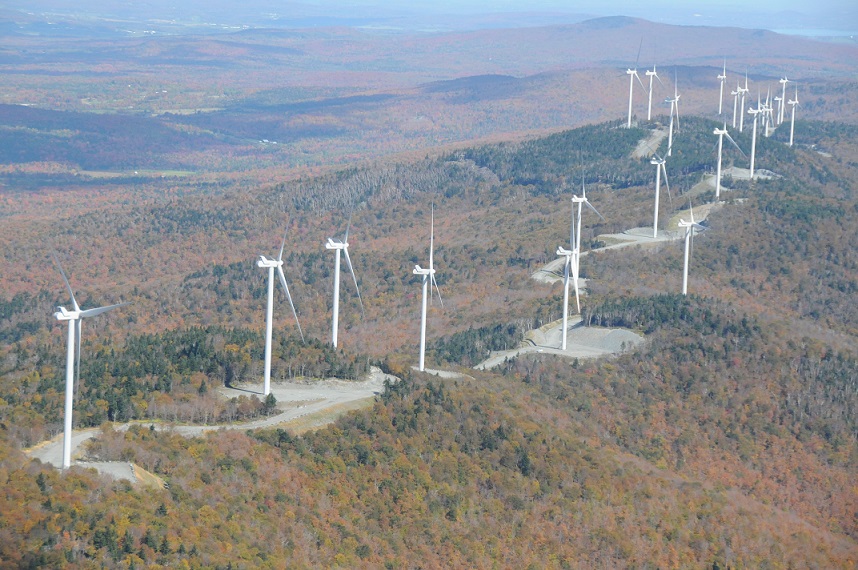
by Deep Green Resistance News Service | Aug 27, 2018 | Biodiversity & Habitat Destruction
by Suzanna Jones / Counterpunch
Walden, Vermont–In his 2008 book Deep Economy, Bill McKibben concludes that economic growth is the source of the ecological crises we face today. He explains that when the economy grows larger than necessary to meet our basic needs – when it grows for the sake of growth, automatically striving for “more” – its social and environmental costs greatly outweigh any benefits it may provide.
Unfortunately, McKibben seems to have forgotten what he so passionately argued just five years ago. Today he is an advocate of industrial wind turbines on our ridgelines: he wants to industrialize our last wild spaces to feed the very economy he fingered as the source of our environmental problems.
His key assumption is that industrial wind power displaces the use of coal and oil, and therefore helps limit climate change. But since 2000, wind facilities with a total capacity equivalent to 350 coal-fired power plants have been installed worldwide, and today there are more – not fewer – coal-fired power plants operating. (In Vermont, the sale of Renewable Energy Credits to out-of-state utilities enables them to avoid mandates to reduce their fossil fuel dependency, meaning that there is no net reduction in greenhouse gas emissions.) At best, industrial wind simply adds more energy to the global supply. And what for? More! More energy than the grid can carry, more idiotic water parks, more snowmaking, more electronic gadgets, more money for corporations.
Why should we spend millions of dollars to destroy wildlife habitat, kill bats and eagles, pollute our headwaters, fill valuable wetlands, polarize our communities, make people sick, mine rare earth metals – just to ensure that we can consume as much or more next year than we did this year?
The costs of industrial wind far outweigh the benefits… unless you are a wind developer. Federal production tax credits and other subsidies have fostered a gold rush mentality among wind developers, who have been abetted by political and environmental leaders who want to appear “green” without challenging the underlying causes of our crises. Meanwhile, average Vermonters find themselves without any ability to protect their communities or the ecosystems of which they are part. The goal of an industrial wind moratorium is to stop the gold rush so we can have an honest discussion on these issues. Why does this frighten proponents of big wind? Because once carefully examined, industrial wind will be exposed for the scam that it is.
McKibben’s current attitude towards the environment has been adopted by politicians, corporations, and the big environmental organizations. Environmentalism has been successfully mainstreamed, at the cost of its soul. This co-opted version isn’t about protecting the landbase from the ever-expanding empire of humans. It’s about sustaining the comfort levels we feel entitled to without exhausting the resources required. It is entirely human-centered and hollow, and it serves corporate capitalism well.
In Deep Economy, McKibben points out that the additional “stuff” provided by an ever-growing economy doesn’t leave people happier; instead, the source of authentic happiness is a healthy connection to nature and community. As Vermonters have already discovered, industrial wind destroys both.
What industrial wind represents should be obvious to everyone: this is business-as-usual disguised as concern for the Earth. Far from genuine “environmentalism”, it is the same profit- and growth-driven destruction that is at the root of every ecological crisis we face.
Suzanna Jones is an off-the-grid farmer living in Walden. She was among those arrested protesting the Lowell wind project in 2011.
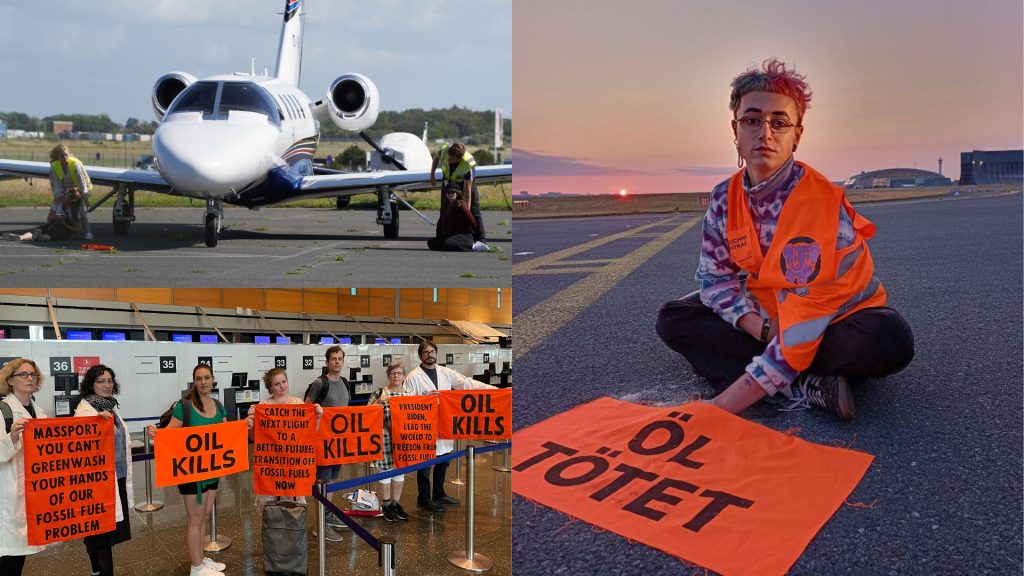
by DGR News Service | Oct 9, 2024 | ACTION, Direct Action, The Problem: Civilization
Editor’s note: DGR does not support the renewable energy transition aspect of such a treaty.
By Alexandria Shaner September 11, 2024 / Waging Nonviolence

An unprecedented alliance of climate groups is targeting airports on three continents to demand a binding treaty to end fossil fuels by 2030.
A new international coalition is disrupting airports to make one demand: the adoption of a treaty to end fossil fuels by 2030.
Under the banner Oil Kills, small groups of activists have occupied airport departure lounges, plane cabins, terminals, tarmacs and roads across three continents — and they aren’t done yet. Here are the numbers so far: 500 people, 31 airports, 22 groups, 166 arrests, 42 people on remand in prison — all in support of their one demand.
The coalition formed when members of Extinction Rebellion, the A22 Network and Stay Grounded began reaching out to other groups globally. What resulted was an unprecedented alliance of civil resistance groups focused on the sustained disruption of airports — a key pillar of the fossil fuel economy.
Unifying aims, collective strategy and diverse tactics
All Oil Kills participants are committed to nonviolent direct action and to the central demand, but from there, individual creativity and context has led to an array of actions. The resulting structure is a decentralized yet cohesive power bloc with unified aims that becomes more than the sum of its parts, rather than a lowest common denominator coalition.
Each participating group has adopted the central demand that governments must work together to establish a legally binding treaty to stop extracting and burning oil, gas and coal by 2030, as well as supporting and financing poorer countries to make a fast, fair and just transition. But each local group also brings its own unique knowledge and demands which are in turn supported by the coalition. Futuro Vegetal in Spain, for example, focuses on the imperative to adopt a plant-based agri-food system while Students Against EACOP in Uganda demand a stop to the East African Crude Oil Pipeline — and all stand in solidarity with one another.
Each group also brings its own creative tactics, from airport glue-ins, to plane occupations, to spray-painting terminals, to street marches. “The airports don’t know what to expect because we don’t even know exactly what to expect from each other — it’s beautiful and effective,” said a coalition member who requested to remain anonymous for legal reasons.
After the initial whirlwind of actions in July, with 37 arrests over the first two days alone, disruptions have continued steadily across three continents, with especially relentless activity in Germany where Letzte Generation has held several actions in multiple airports.
On Aug. 9, Students Against EACOP in Uganda joined the Oil Kills campaign, planning a peaceful march to the parliament in Kampala and the delivery of a petition demanding an end to the East African Crude Oil Pipeline, and for their government to sign the treaty to end fossil fuels.
But the police mounted roadblocks to stop the march from starting, and arrested 45 student activists on public buses and their three bus drivers on arrival. Two students managed to slip away and regrouped, reaching the parliament building with petition in hand before also being violently arrested.
Kamya Carlos, a student at Kyambogo University and spokesperson for Students Against EACOP, connects the inequitable and ecocidal nature of today’s airline industry to its origins in neocolonial extractivism. “New oil, gas and coal infrastructure continues to exacerbate the climate crisis. As the global temperatures hit their tipping points it is clear that projects such as the East African Crude Oil Pipeline should never be constructed in the first place,” he said. “These projects, which end up being used almost exclusively by rich people and polluting the atmosphere, should never be allowed by right thinking members of society. We demand the government to sign a fossil free treaty and call an end to EACOP.”
Even though police repression represents a major threat, on Aug. 27, 20 climate activists and persons affected by the oil pipeline came back out in another peaceful march to petition Uganda’s Ministry of Energy. They were again violently dragged from the street by police in fatigues and held on remand until Sept. 6, when the court finally granted their release on bail. All 20 have been ordered to appear for a hearing on Nov. 12.
“The resilience under extreme repression shown by Students Against EACOP is an inspiration and metaphor for the Oil Kills movement,” said Jamie McGonagill, an Oil Kills member from XR Boston. “We refuse to die.”
You can’t arrest a rising sea
As of this writing, 22 Oil Kills activists remain in custody in Uganda, six in Germany and 14 in the U.K. Speaking to the increasing criminalization of dissent, McGonagill explained that “draconian responses that imprison nonviolent climate activists, especially as we’ve seen lately in the U.K. and in Uganda, show that the authorities misunderstand us. They will not stop us. We will just get more and more creative.”
Oil Kills is not alone in facing repression. On Aug. 8 in New York City, a 63-year-old grandfather and professional cellist, John Mark Rozendaal, was arrested and hit with a criminal contempt charge, carrying a maximum sentence of seven years in jail, for performing Bach’s “Suites for Cello” at Citibank’s headquarters. Rozendaal was participating in the Summer of Heat campaign to pressure Citibank to divest from fossil fuels through sustained nonviolent civil disobedience. Connecting this case to the burgeoning international movement, U.N. Special Rapporteur on Human Rights Defenders Mary Lawlor, in following Rozendaal’s case, has expressed her “strong concern” at the severity of the charges.
In a disturbing trend that has become the new normal in Italy, peaceful eco-activists are being branded a “danger to security and public order,” served with specious charges, banned from cities without trial, and criminalized under anti-terrorist laws intended to prosecute the Mafia.
Last week in the U.K., several high profile journalists and activists affiliated with the movement for Palestinian liberation were arrested in a sweep by counter-terrorism police for their opposition to genocide. They have been held under Section 12 of the U.K.’s Terrorism Act, which outlaws support for a “proscribed organization.” Such an application of the law would mean that you can go to jail for 14 years for expressing an opinion.
XR NYC organizer Meg Starr, a long-time Puerto Rican solidarity activist and coordinator of the XR Allies sub-circle, noted that the links between genocide and ecocide — in Palestine and elsewhere — are becoming clearer and more important to emphasize. “Our targeting of Citibank,” Starr commented, “included a focus on Citi’s major support of the Israeli military as part of their role as the world’s leading financier of oil and gas expansion.”
Roger Hallam, co-founder of Extinction Rebellion and Just Stop Oil, was recently sentenced to five years in prison for making a speech over Zoom in what is being called a “grotesque sham-trial.”
“Repression is not a gradual process, it leaps out at you and takes you off guard,” he warned from his prison cell. “Do you remember the Solidarity leaders in Poland? They were invited into talks with the Polish government but when they got to the meeting, they were arrested in one fell swoop and imprisoned for years. You don’t think it will happen to you and then it does.”
Hallam’s message is that we can expect more repression, but that authorities must also expect more resistance. “You can’t negotiate with physics, with a thousand peer-reviewed articles,” he wrote. “Just Stop Oil reminds us what resistance, that far-off folk memory relegated to Netflix, actually looks like in the present moment. Thousands of arrests, hundreds of imprisonments and a five-year sentence for making a speech.”
In a statement announcing a pause in international actions to allow politicians to consider their demands, Oil Kills echoed the realism of Hallam’s framing. “The facts are clear, we are flying towards the obliteration of everything we know and love. Continuing to extract and burn oil, gas and coal is an act of war against humanity. …To know these facts and yet to have no plan to end the extraction and burning of oil, gas and coal is reckless and immoral.”
They point out that while activists sounding the alarm and demanding change are increasingly criminalized, our politicians are actually the ones who are complicit in the greatest crime in human history. “Whether those in charge realize that they are engaging in genocide is not the question. For this is how it will be seen by the next generation and all future generations,” Oil Kills warned. “For now we are taking a pause, but governments must take heed: you cannot arrest your way out of this, just as you cannot imprison a flood or serve injunctions on a wildfire.”
Oppose oil injustice, propose mobility justice
Stay Grounded is a network of individuals, local airport opposition and climate justice groups, NGOs, trade unions, initiatives fostering alternatives to aviation like night trains and organizations supporting communities that struggle against offset or projects to develop so-called “sustainable aviation fuels.” Importantly, Stay Grounded goes beyond affirming the conclusion that business as usual is not an option, and stands for a 13-step program to transform transport, society and the economy to be just and environmentally sound.
“Flying is the fastest way to fry the planet so it’s key to start by cutting pointless and unfair flights like private jets or short haul flights,” said Inês Teles, a spokesperson for Stay Grounded and an Oil Kills member. “Our actions disrupting airports should be a shock to the system that is driving us towards climate catastrophe.”
In summary, Stay Grounded’s program begins with a positive vision for justice. It includes advice for achieving a just transition, shifting to other modes of transportation, developing economies of short distances and changed modes of living, as well as strong political commitments for land rights, human rights and climate justice.
Their program then details what must be avoided — obvious yet important items like growing the harmful air travel industry, including infrastructure expansion, loopholes and privileges for aviation, and common greenwashing pitfalls like carbon offsetting, biofuels, and illusory technocentric fixes.
Though Stay Grounded’s aims are more specific to the air travel industry than Oil Kills’ unifying demand for a treaty to end fossil fuels by 2030, coalition members are able to build on these positive aims, utilizing leadership from frontline communities affected by the air travel industry. Sharing and even cross-pollinating pro-social and ecologically healthy programs, in addition to opposing destructive practices, has been an effective way of galvanizing and sustaining support across diverse movements and communities.
Covering activism isn’t activist
The choice to focus on disrupting the air travel industry in order to pressure governments to adopt a fossil fuel non-proliferation treaty is as bold as the demand itself. Much of the media’s reaction so far has been unsurprisingly harsh, condemning the disruptions as “not the right way to do it.” Very little critical analysis has been audible above the din, but that doesn’t mean critical analysis isn’t happening.
It turns out, if you actually listen to them, that Oil Kills activists take strategy extremely seriously — after all, they’re knowingly putting their own freedom on the line through their actions. That is not a decision to be taken lightly, especially in today’s legal context. While news coverage of their “stunts” has circulated widely, what about the reasons behind their actions and assessments of their impact?
Covering climate activism well is a critical part of getting the climate story right. Too often journalism focuses on protesters’ tactics and not the problems they’re drawing attention to or the arguments they’re making. In a recent roundtable discussion, author, journalist and activist Bill McKibben urged fellow journalists to consider that, “we can serve our audiences better, treating activists as the newsmakers they are, rigorously evaluating their arguments as we would a public official.”
Journalists often shy away from foregrounding activists as sources of information and analysis for fear of being perceived to be more “activist” than “objective.” This framing is entirely misleading however, and can more accurately be explained as the pressure to avoid platforming those seeking to change the system in deference to those whose position exists to maintain the system. Why is a politician or a business owner an appropriate subject, but not an activist? There is no objectivity in this, but there are salaries and awards.
The myth that journalism must keep activism at arms length also misses the point that many of these ordinary people taking action are some of the best informed on the biggest news story of our time: the climate and ecological emergency. Activists have been speaking on climate science and policy for decades, many have even been personally affected by ecological disaster, but they have been almost exclusively ignored by the mainstream press. After decades of fossil fuel industry gaslighting, it turns out the activists have been right all along. It’s past time to hear these people out as legitimate subjects and newsmakers, able and deserving to speak about their work and their areas of expertise.
Why target air travel?
First, the obvious answer: oil kills. And the air travel industry is very, very oily. Aviation is by far the mode of transport with the biggest climate impact. If aviation was a country, it would be one of the top 10 emitters.
Emissions from aviation are rising more rapidly than any other sector of the economy. The number of aircraft and the number of passenger-miles flown is expected to double over the next 20 years. If left unchecked, they could consume a full quarter of the available carbon budget for limiting temperature rise to 1.5 C.
Second, oil isn’t extracted equitably, burned equitably, and neither does it kill equitably. At the turn of the millennium, less than 5 percent of the world’s population had ever sat in an aircraft. But it is mostly non-flyers who bear the brunt of the climate crisis and the negative effects of airport expansion like land grabbing, noise, particle pollution and health issues. Communities in the Global South that have barely contributed to the crisis are affected most. Indeed, well before the repression of the Oil Kills coalition, climate activists — especially in Latin America — have faced what is being termed “ecopoliticide”: the targeted and strategic murder of those who dare take action.
Stephen Okwai, a project affected person who has joined the movement to stop the EACOP pipeline in Uganda, feels there is now greater risk in inaction than in protesting. A project affected person, or PAP, is a legal term for the people directly affected by land acquisition for a project through loss of part or all of their assets including land, houses, other structures, businesses, crops/trees and other components of livelihoods. They are legally owed compensation, but in the case of Okwai and others affected by EACOP, there has been no such justice.
“Currently most of us in western Uganda are being disturbed,” he explained. “You cannot know when the rain is going to start and when it will stop yet most of these people are farmers. The effect of this oil project is greatly impacted on the people.”
After he was arrested during the Aug. 27 march in Kampala, Robert Pitua, a member of Oil Kills, Students Against EACOP, and a PAP, said that, “Livelihood restoration programs [have been] insufficient, and now we cannot manage to restore the initial livelihoods we had. Most people are given unfair and inadequate compensation.” This structural and planned destruction of hundreds of communities has left PAPs no choice but to resist, and is the source of a common refrain in Students Against EACOP’s demonstrations: “We refuse to die.”
This leads to the third reason to target aviation. The Oil Kills uprising is highlighting that the problem of aviation is part of a bigger story of injustice — it is in fact a pillar helping to hold up a system of injustice. The air travel industry is contrary to the need to eliminate fossil fuel use; it is tied to the military-industrial complex; and it is connected with the undue influence of big business on public policy, including trade, economic development and climate.
Aviation remains fossil fuel dependent, yet the industry promotes false solutions such as new aircraft technologies, which do not yet exist, in order to continue to pollute for profit. Offsets and biofuels fail to reduce emissions while endangering food supplies, biodiversity and human rights.
“Not only is the air travel industry a cornerstone of globalized fossil capitalism, but it is also a symbol of inequity,” Jamie McGonagill said. “By disrupting a major column of the system, we aim to disrupt the system itself.”
Rather than plentiful data and common sense reasoning, it is more often a powerful underlying consciousness that has spurred many to action. When asked why it was necessary to disrupt air travel across Europe and North America, Just Stop Oil spokespeople replied, “because governments and fossil fuel producers are waging war on humanity. Even so-called climate leaders have continued to approve new oil, gas and coal projects pushing the world closer to global catastrophe and condemning hundreds of millions to death.”
The Oil Kills coalition has rallied around reality with the seriousness it deserves, refusing dystopia by disrupting it, and demanding a clear and urgent path towards repair. “Our leaders from wealthier countries must seek a negotiating mandate for an emergency Fossil Fuel Treaty,” said coalition members in an Aug. 14 statement. “They also need to immediately finance and support poorer countries to make a fast, fair and just transition.”
https://drive.google.com/file/d/1QbDnrL9HSbGzuq9r89WmdcJVNMQQ1mfK/view?usp=sharing
Assessing impact
If increased media attention on the climate and ecological emergency is any indicator of success, and it is, the Oil Kills uprising is punching well above its weight. “Oil Kills” was mentioned over 2,900 times in the press during the first week of the campaign. The Fossil Fuel Non-Proliferation Treaty initiative has also never attracted so much media attention worldwide, with an increase of over 1,000 percent in mentions from the week prior to the campaign’s launch. Oil Kills actions drew comments from politicians, government officials and from the vice president of Norwegian oil giant, Equinor. For only 500 people spread out over three continents, they have indeed been hard to ignore.
It is true, not all publicity is created equal — but pleasing the general public is not always the priority. In a recent article, Mark Engler and Paul Engler, coauthors of “This is an Uprising,” discussed why protest works even when not everyone likes them. They explain that a very common result is that, when asked about a demonstration that makes news headlines, respondents will report sympathy for the protesters’ demands, but they will express distaste for the tactics deployed. They will see the activists themselves as too noisy, impatient and discourteous.
The coauthors, both experienced activists and resistance scholars, point out that this is actually an age-old dynamic, and one addressed eloquently by Martin Luther King Jr. in his renowned 1963 “Letter from a Birmingham Jail.” They explain that, “this letter was written not as a response to racist opponents of the movement, but rather to people who professed support for the cause while criticizing demonstrations as ‘untimely’ and deriding direct action methods. ‘Frankly I have yet to engage in a direct action campaign that was ‘well timed’ in the view of those who have not suffered unduly from the disease of segregation,’ King quipped. But confronting these criticisms, he made the case for why the movement’s campaigns were both necessary and effective.”
In a similar vein, Oil Kills participants, like medical student Regina Stephan who recently took action at the Berlin airport with Letzte Generation, feel they have no choice but to act: “Just yesterday, the state of Lower Saxony gave the green light for new gas drilling off Borkum,” Stephan said. “That can’t be true! As long as our decision-makers work hand in hand with the fossil fuel companies and put profit before human life, I’m standing here — on the tarmac — and I can’t help it!”
Joining in this sentiment, Anja Windl, who took action at Stuttgart airport said very succinctly: “As long as our livelihoods are being systematically destroyed, our protests will not stop.”
Importantly, Oil Kills participants are not demanding that everyone utilize the same tactics. Rather, these activists are urging others to join the climate justice movement in diverse ways. Anja continued, “if you also want to campaign for an end to fossil fuels, you don’t have to sit on an airfield like I did: Just come to a Disobedient Assembly near you!”
In recent years, there has been considerable research published that attempts to measure radical flank effects and track the polarizing effects of movements. Mark Engler and Paul Englers’ analysis cautions that, “while there are limits to how much protest impacts can be precisely quantified, the cumulative result of such research, in the words of one literature review, is to point to ‘strong evidence that protests or protest movements can be effective in achieving their desired outcomes,’ and that they can produce ‘positive effects on public opinion, public discourse and voting behavior.’” They conclude that both the historical experience of organizers and recent studies provide backing for the idea that “support for a movement’s issue can grow, even when a majority of people do not particularly like the tactics being used.”
Finally, success cannot be fully measured by public opinion, especially when the strategy is to trouble public consensus. Oil Kills has been very clear that they are not acting in order to sooth or please anyone — they are intentionally sounding the alarm as a way of empowering people to act. By treating the climate crisis as a crisis, and reacting accordingly, activists are, in a sense, giving other people permission to do the same and showing them how. It’s like when someone is real with you and that makes you feel like you can be real too — and we all need to get real, real fast. The spell of complacency is like the tranquilizer that helps walk a cow to slaughter. Oil Kills is shouting, “wake up and live!”
In a debrief by the Oil Kills campaign on Aug. 16, they addressed the public: “it is time to face reality: no one is coming to save us. There is no free pass, no shelter from the coming storm. Our best chance of survival is to resist. To join the growing numbers of ordinary, everyday people, from across the globe who are refusing to stand by while hundreds of millions of innocent people are murdered.”
Offering a pathway forward out of doom, Oil Kill’s messaging has remained crystal clear: “The climate crisis will not end until every single country has phased out fossil fuels, [and] those who bear the greatest responsibility and have the greatest capacity must do the most … In this time of crisis, we expect our governments to work collaboratively, as we have done, and negotiate a Fossil Fuel Treaty to end the war on humanity before we lose everything.”
The next rebellion is coming
Coming back down from the hugeness of our crisis and into ourselves as individuals often causes a feeling of paralysis, especially for the majority of people not yet interconnected within communities of resistance and solidarity. But there have been actions where small groups or even lone activists have held up an Oil Kills banner and received media coverage and support because they are part of a global campaign which can’t be ignored. Every single contribution adds to that.
In a Sept. 6 letter to climate activist prisoners of conscience, Naomi Klein wrote, “In a world that was right-side up, you would be celebrated as the ones who helped break the spell that is setting our world on fire. In truth, your actions could still do that, if enough people know about them.”
It continues to be an urgent and essential task to ensure that more and more people do know about Oil Kills and other manifestations of resistance, but it is also evident that the world’s elites already understand the threat that these actions represent — the threat of mass uprising. That threat is precisely why nonviolent direct action in defense of planetary life is being criminalized so viciously.
Klein continued, “Movements against climate arson are already converging with movements against genocide and unfettered greed. The next wave of rebellion is coming. Along with the tankers, I see it clearly on the horizon.” The Oil Kills uprising and fellow movements around the world have placed their bodies between those tankers and our shared future to say, “here, and no further.”
If enough of us line up behind them, their actions could very well lead the way to an adoption of a treaty to end fossil fuels by 2030 — that remains to be won. What is for certain is that their actions are troubling the autopilot system, disrupting the mechanics of fossil-capital’s death march and creating desperately needed space to pursue alternate routes. Whatever else lies on the horizon, their contributions are already impacting the world in ways we cannot yet know, but will be unlikely to forget.
This article is co-published with ZNetwork.org.

by DGR News Service | Jan 7, 2021 | Biodiversity & Habitat Destruction
By Lierre Keith, Derrick Jensen, and Max Wilbert
“The beauty of the living world I was trying to save has always been uppermost in my mind,” Rachel Carson wrote.“That, and anger at the senseless, brutish things that were being done.”
Silent Spring, which inspired the modern environmental movement, was more than a critique of pesticides, it was a cri de couer against industrialized society’s destruction of the natural world.
Yet five decades of environmental activism haven’t stopped the destruction, or even slowed it. In those same decades, global animal populations have dropped by 70 percent. Right now, we are losing about one football field of forest every single second. Looking forward provides no solace: the oceans are projected to be empty of fish by 2048.
A salient reason for this failure is that so much environmentalism no longer focuses on saving wild beings and wild places, but instead on how to power their destruction. The beings and biomes who were once our concern have disappeared from the conversation. In their place we are now told to advocate for projects like the Green New Deal. While endangered ecosystems get a mention, the heart of the plan is “meeting 100 percent of the power demand in the United States through clean, renewable, and zero-emission energy sources” in the service of industrial manufacturing.
This new movement is called bright green environmentalism.
Its advocates believe technology and design can render industrial civilization sustainable, and that “green technologies” are good for the planet. Some bright greens are well-known and beloved figures like Al Gore, Naomi Klein, and Bill McKibben as well as organizations like the Sierra Club, Greenpeace, and Audubon. These committed activists have brought the emergency of climate change into consciousness, a huge win as glaciers melt and tundra burns. But bright greens are solving for the wrong variable. Their solutions to global warming take our way of life as a given, and the planet’s health as the dependent variable. That’s backwards: the planet’s health must be more important than our way of life because without a healthy planet you don’t have any way of life whatsoever.
The bright green narrative has to ignore the creatures and communities being consumed. Take the Scottish wildcat, numbering a grim 35, all at risk from a proposed wind installation. Or the birds dying by the thousands at solar facilities in California, where concentrated sunlight melts every creature flying over.
Or the entire biome of the southern wetland forest, being logged four times faster than South American rainforests. Dozens of huge pulp mills export 100 percent of this “biomass” to Europe to feed the demand for biofuels, which bright greens promote as sustainable and carbon-neutral. The forest has a biological diversity unmatched in North America, lush with life existing nowhere else and barely hanging on. This includes the Southeastern American Kestrel. They need longleaf pine savannahs, and longleaf pine have been reduced to 3% of their range. The kestrels depend for their homes on red-cockaded woodpeckers, who exist as a whisper at 1% of historic numbers. Last in this elegiac sample is the gopher tortoise. Four hundred mammals, birds, reptiles, amphibians, and insects cannot survive without the protective cover of the burrows dug by tortoises, tortoises now critically endangered. All these creatures are our kin: our fragile, wondrous, desperate kin, and environmentalists would have them reduced to pellets, shipped to Europe, and burned, while calling their slaughter “green.”
Facts about renewable energy are worse than inconvenient.
First, industrial civilization requires industrial levels of energy. Second is that fossil fuel — especially oil — is functionally irreplaceable. Scaling renewable energy technologies like solar, wind, hydro, and biomass, would constitute ecocide. Twelve percent of the continental United States would have to be covered in windfarms to meet electricity demand alone. To provide for the U.S.A.’s total energy consumption, fully 72% of the continent would have to be devoted to wind farms. Meanwhile, solar and wind development threaten to destroy as much land as projected urban sprawl, oil and gas, coal, and mining combined by 2050.
Finally, solar, wind, and battery technologies are, in their own right, assaults against the living world. From beginning to end, they require industrial-scale devastation: open-pit mining, deforestation, soil toxification that’s permanent on a geologic timescale, extirpation of vulnerable species, and use of fossil fuels. In reality, “green” technologies are some of the most destructive industrial processes ever invented. They won’t save the earth. They’ll only hasten its demise.
There are solutions, once we confront the actual problem.
Simply put, we have to stop destroying the planet and let the world come back. A recent study in Nature found we could cut the carbon added to the atmosphere since the Industrial Revolution in half by reverting 30% of the world’s farmland to its natural state. This would also preserve 70% of endangered animals and plants. This is the lowest of low hanging fruit when it comes to combating climate change and healing our planet. Everywhere there are examples of how the wounded are healed, the missing appear, and the exiled return. Forests repair, grasses take root, and soil sequesters carbon. It’s not too late.
The green new deal has reforestation as one of its goals, but it’s not the main goal, as it should be. If environmentalism is going to help save the planet — and if it’s going to respond to global warming commensurate with the threat — it needs to return to its roots, and remember the love that founders like Rachel Carson had for the land. We need to pledge our loyalty to this planet, our only home.
There’s no time for despair.
Wildcats and kestrels need us now. We have to take back our movement and defend our beloved. How can we do less? And with all of life on our side, how can we lose?
Derrick Jensen, Lierre Keith, and Max Wilbert are the authors of the forthcoming book, Bright Green Lies: How the Environmental Movement Lost Its Way and What We Can Do About It. The book will be available March 16th, but you can pre-order to your local bookstore or library via IndieBound now.

by DGR News Service | May 22, 2020 | Biodiversity & Habitat Destruction
Grassroots activist Suzanna Jones challenges the idea that green energy is good and rebukes the corporations and ideologically-captured organizations who promote it.
By Suzanna Jones
The recently released documentary Planet of the Humans takes direct aim at the major threat to the Earth.
It does this by asking fundamental questions: can Nature withstand continued industrial extraction; can humans – particularly those in the dominant West – persist in taxing the natural world to fulfill our own ‘needs’ and desires; is ‘green’ energy the savior for our climatic and environmental problems or is it a false prophet distracting us from confronting the gargantuan elephant in the room, what writer Wendell Berry calls “history’s most destructive economy”?
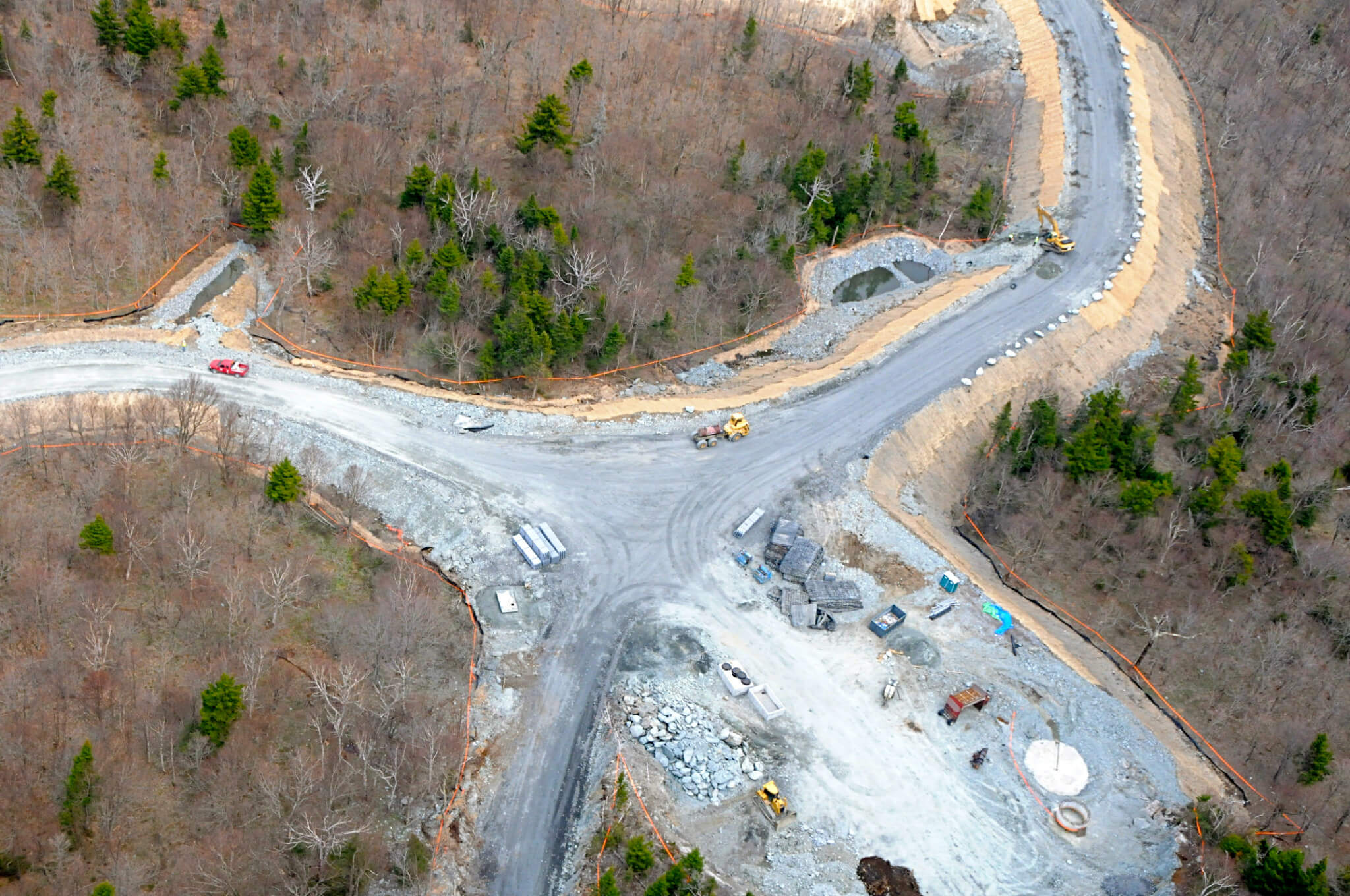
New roads built for the Lowell Wind Energy site in Vermont destroy and fragment important wildlife habitat for black bears, moose, and bobcat among others.
The Hypocrisy of Mainstream “Environmentalism”
Filmmakers Jeff Gibbs, Ozzie Zehner and Michael Moore don’t just ask questions, they highlight the hypocrisies of big shots like Al Gore and the national Sierra Club. Even Vermont comes in for less than flattering commentary. Planet of the Humans depicts Green Mountain Power‘s ridge-destroying Lowell Mountain industrial wind project, Burlington’s McNeil wood-burning electric generating plant, and Middlebury College’s biomass gasification facility as examples of the renewable energy delusion. And Bill McKibben, Middlebury’s Scholar-in-Residence, is cast as a string that connects all three.
The film has struck a nerve. Those depicted unfavorably have reacted. Some who admit to having enjoyed Michael Moore’s filmmaking strategy in the past don’t find him so funny this time. The criticisms reveal how much power and money lie behind the renewables-as-savior myth. With so much at stake, the industry and big environmental organizations have little appetite for discussing or even acknowledging the unsavory side of the technologies. And ultimately, the core issues remain unaddressed; the most important things remain unspoken.
Sustaining the Planet vs. Sustaining Industrial Civilization
Frankly, the green energy ‘movement’ is really about sustaining our way of life and the economic system that it depends upon, not the health of the biosphere. Capitalism is brilliant at co-opting anything that resists it. Green energy – like much of the broader environmental movement – is no exception. It’s business-as-usual in camouflage.
Back when Green Mountain Power’s bulldozing and blasting began at Lowell Mountain, a group of locals organized ‘open-house’ walks up the mountain to view the devastation. Hundreds attended these fall/winter treks. Shock and heartbreak were the usual response. Bill McKibben was personally invited to attend. Though his response was polite, he would not be coming. He dismissed our concern for the mountain as “ephemeral.”

Ephemeral?
That word underscores what has gone so terribly wrong with green energy “environmentalism.” Something is absent. That something? Love. Love of the places and living beings that are suffering or being destroyed so that we can live our electronic, nature-less existence. Affection for the natural, non- human world is missing in the discussions about climate, carbon and techno-fixes. Nothing seems to matter now but humans and their desires.
“Although it’s morally wrong to destroy the land community, people are going to sustain it, not because it’s morally right but because they want to; affection is going to be the determining motive”, Wendell Berry has explained in the past. “Economic constraints might cancel out affection, but genuine affection is going to be the motivating cause.”
The Moral Basis of Organizing for Justice
Without affection, we’re more likely to thoughtlessly sacrifice living beings on the altar of economics. When the film reveals who is paying the ultimate price for our ‘green’ energy consumption, we recognize affection for the casualty it has become. We are half-asleep, anesthetized by the barrage of meaningless marketing, with its hollow premise that we can continue to consume our way to happiness.
As I was planting in the garden this warm, spring day, the returning swallows joyfully zipping overhead made me stop. Usually this ritual is accompanied by the background droning of distant car traffic, but due to the pandemic, the infernal engines were silent. It made me wonder. Can we live in healthy reciprocity with the natural world? Can we make the shared economic sacrifices that are necessary or will we continue to sacrifice Nature? Can we make drastic reductions in consumption and live more local, less materially prosperous, more fulfilling lives? Can we replace modernity’s painful alienation from Nature with a genuine sense of intimacy, affection, meaning and responsibility? Will those in power let us? Will we allow them to decide for us?
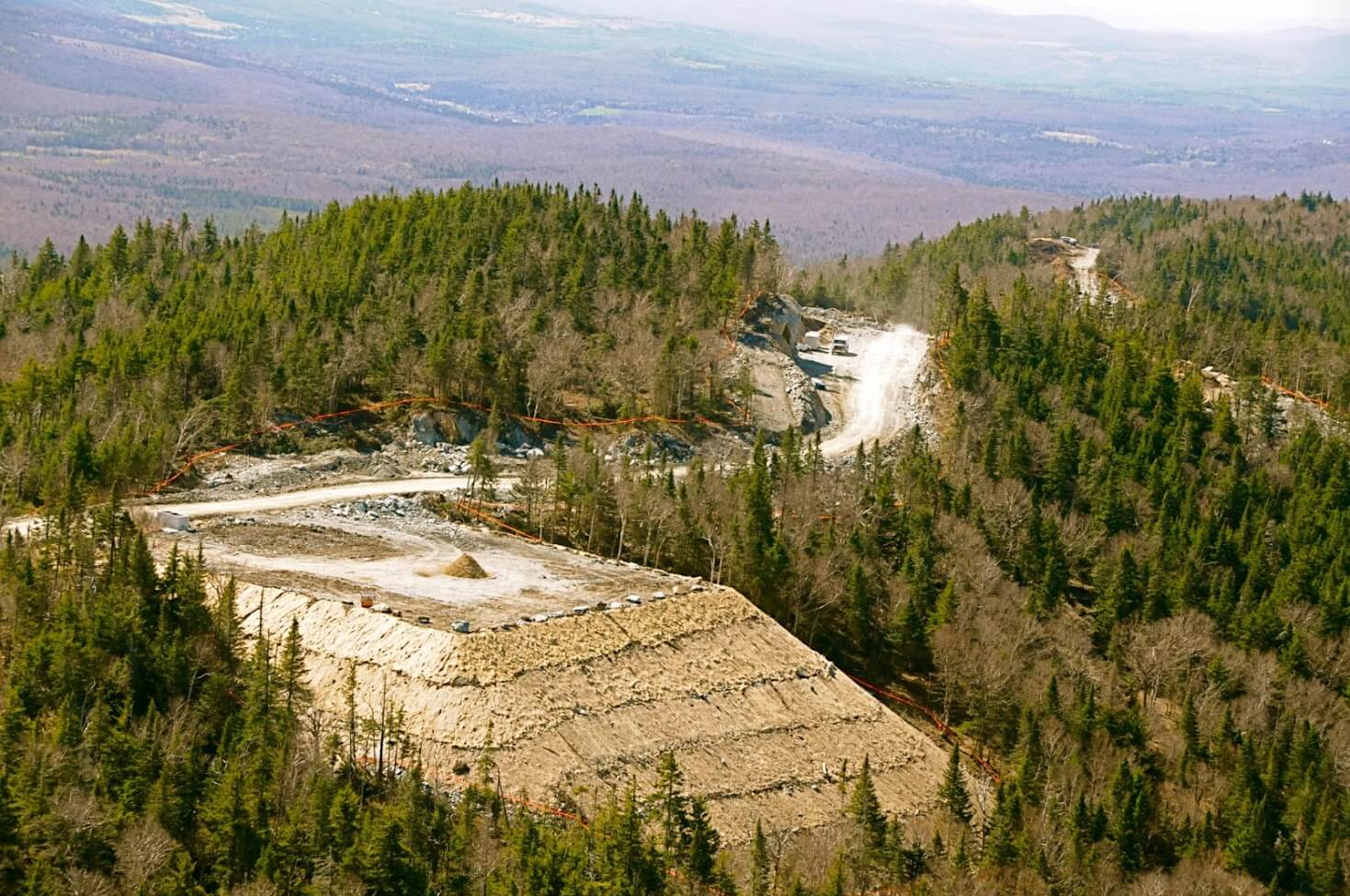
On of 21 wind turbine pads at Lowell Wind Project in Vermont.
Our way of life is inherently unsustainable. We can’t buy or build our way out of this one. Yes, the climate crisis is both undeniable and existential, but it is not the only way the Earth is being destroyed. Simply changing the fuel that powers our destructive, planet-killing system is not a solution.
Planet of the Humans challenges our assumptions and our arrogance. It asks us to face what we have done, experience the grief, and then allow our hearts to consider an entirely new path into the future.
Suzanna Jones lives off grid on a small farm in Northern Vermont. She has been fighting injustice, destruction of the land, and industrial wind projects for decades and has been arrested several times.
Wildlife images by Roger Irwin depict native wildlife near the site of a proposed wind energy facility on Seneca Mountain. That project was canceled due to community organizing in opposition. Aerial photographs by Steve Wright depict Lowell Wind Energy Facility. Check out this photo essay on the impact of “green” energy on mountain landscapes.
To repost this, or any other original DGR content, please contact newsservice@deepgreenresistance.org








